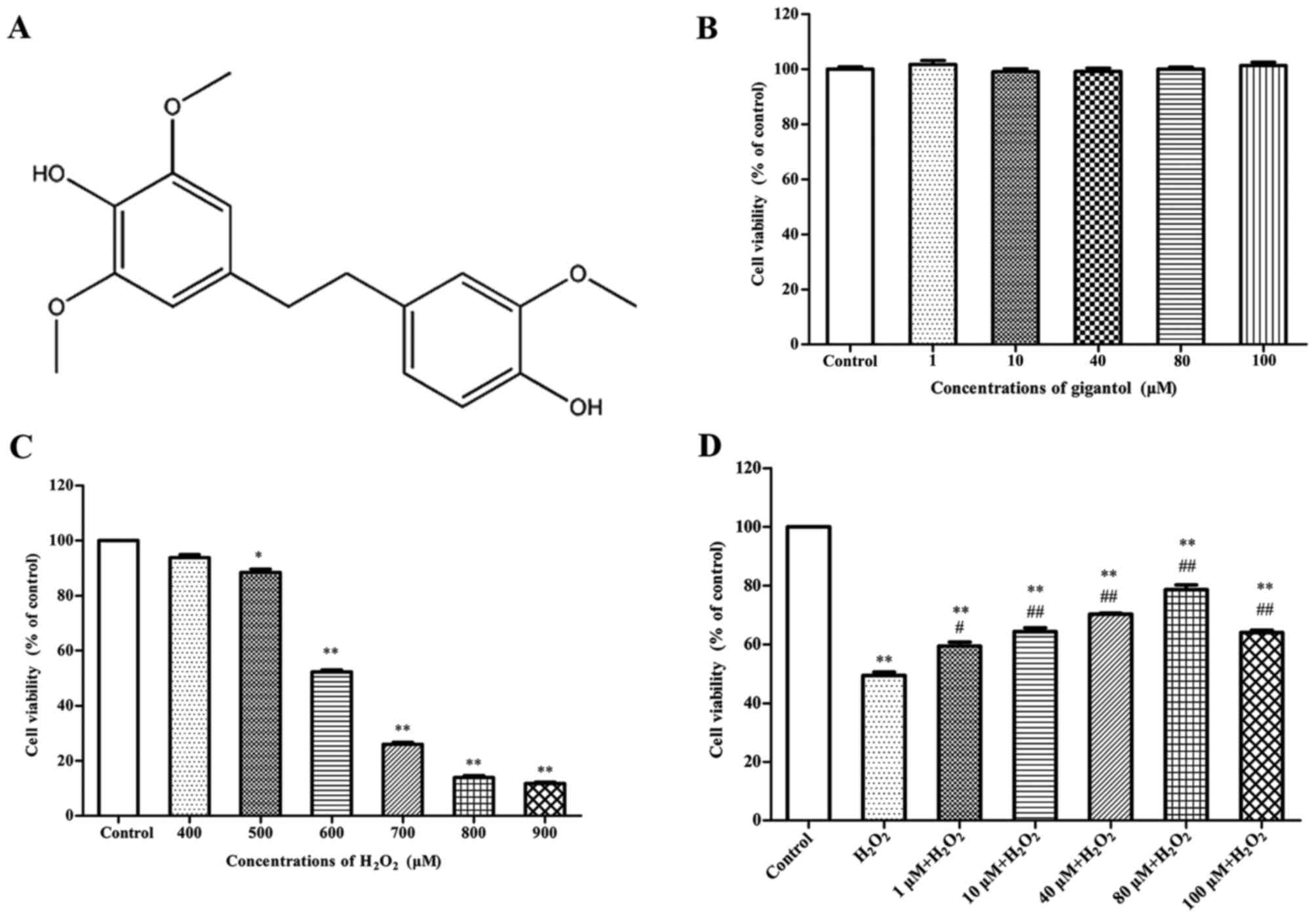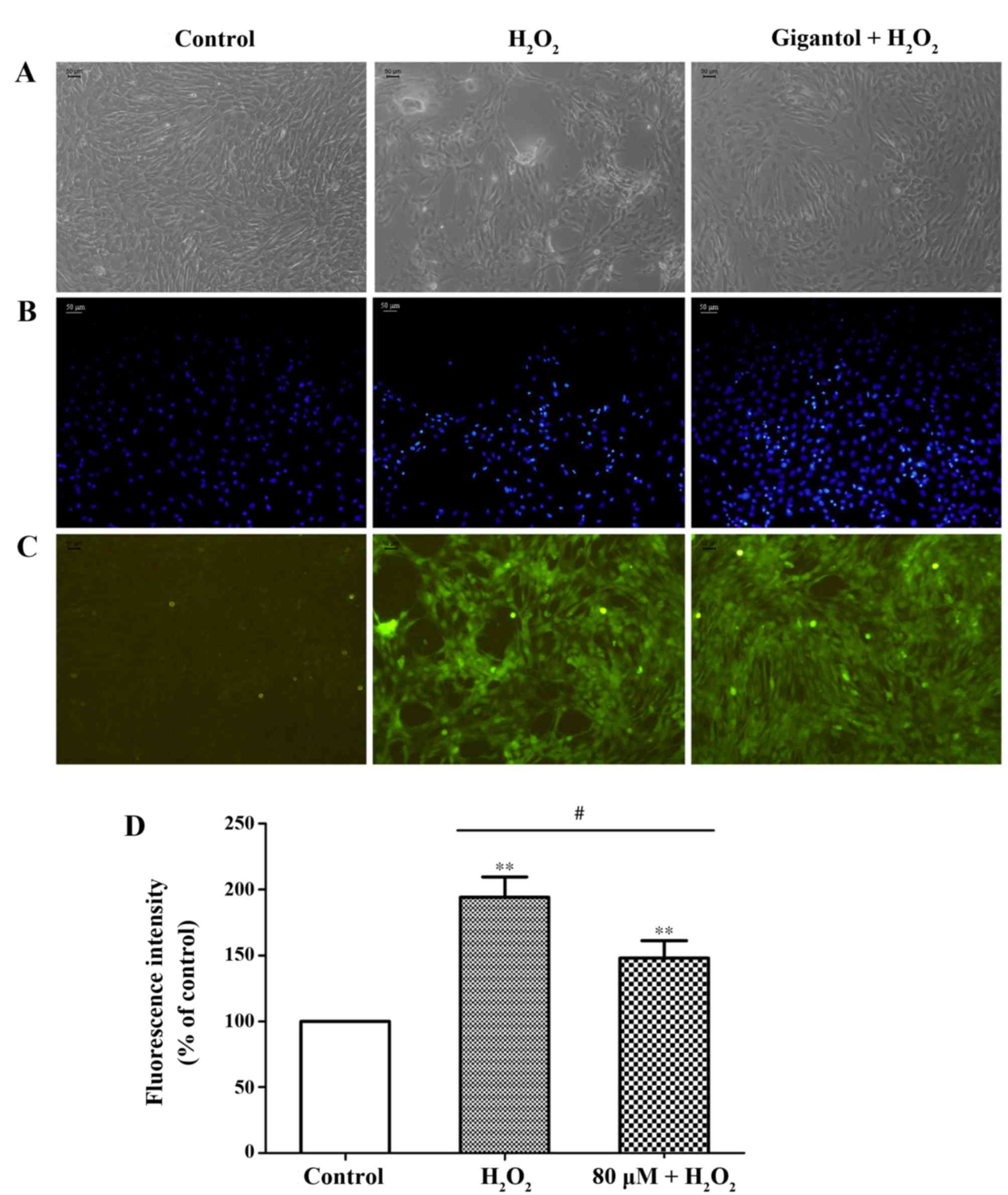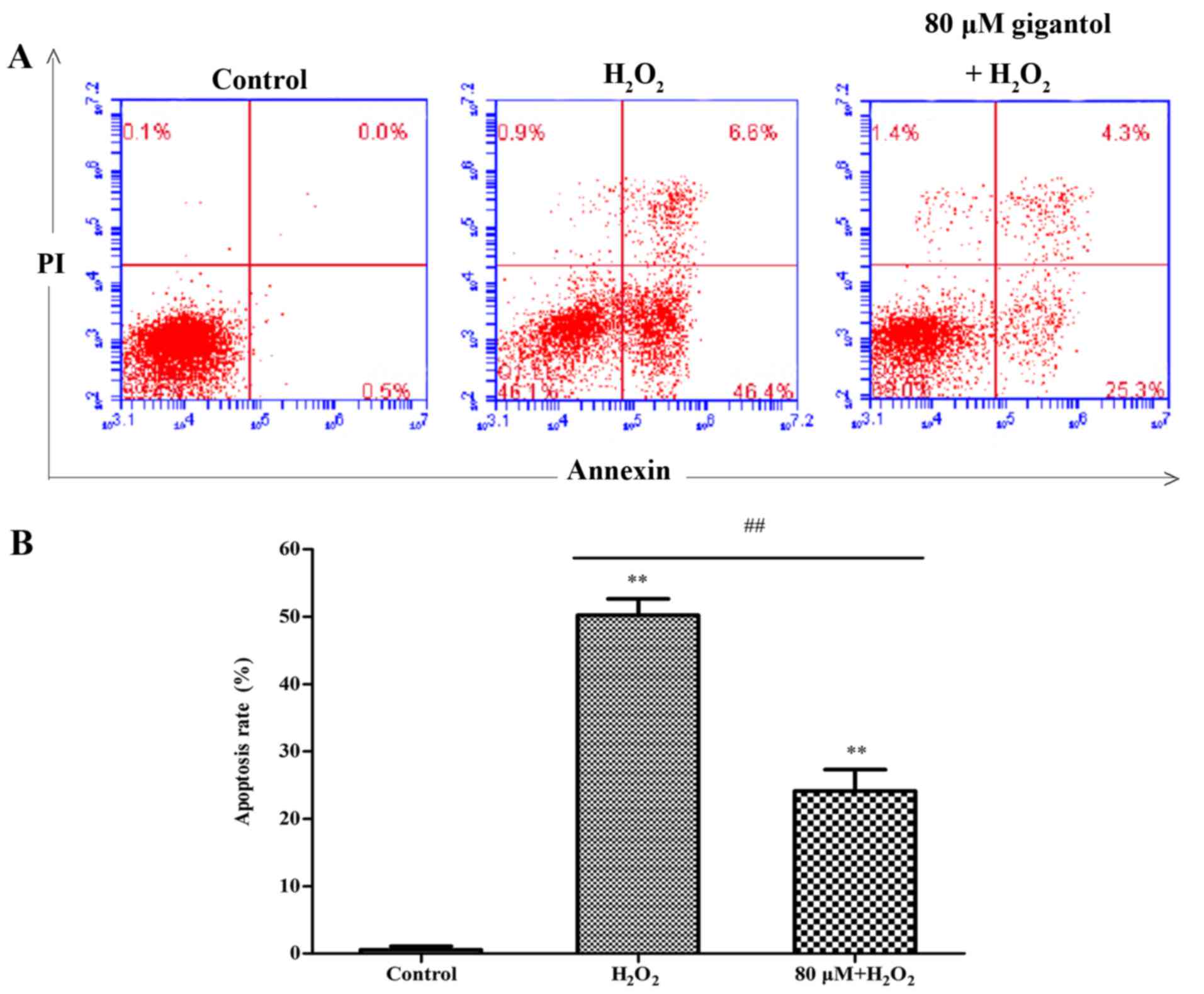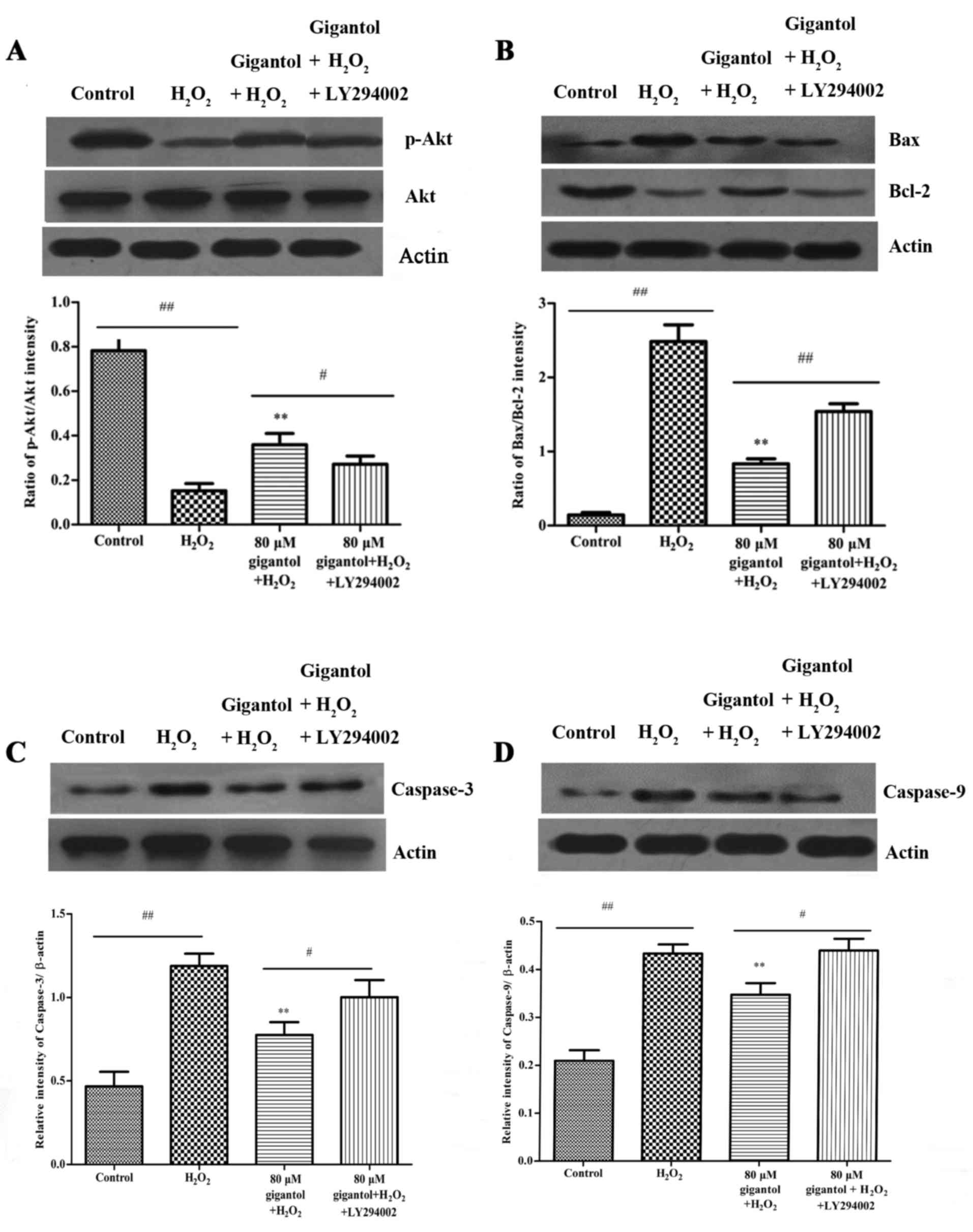|
1
|
Tuan RS, Boland G and Tuli R: Adult
mesenchymal stem cells and cell-based tissue engineering. Arthritis
Res Ther. 5:32–45. 2003. View
Article : Google Scholar : PubMed/NCBI
|
|
2
|
De Keyser J: Autologous mesenchymal stem
cell transplantation in stroke patients. Ann Neurol. 58:653–654.
2005. View Article : Google Scholar : PubMed/NCBI
|
|
3
|
Monsel A, Zhu YG, Gennai S, Hao Q, Liu J
and Lee JW: Cell-based therapy for acute organ injury: Preclinical
evidence and ongoing clinical trials using mesenchymal stem cells.
Anesthesiology. 121:1099–1121. 2014. View Article : Google Scholar : PubMed/NCBI
|
|
4
|
Hao L, Zou Z, Tian H, Zhang Y, Zhou H and
Liu L: Stem cell-based therapies for ischemic stroke. Biomed Res
Int. 2014:4687482014. View Article : Google Scholar : PubMed/NCBI
|
|
5
|
Lee JH, Jung HK, Han YS, Yoon YM, Yun CW,
Sun HY, Cho HW and Lee SH: Antioxidant effects of Cirsium setidens
extract on oxidative stress in human mesenchymal stem cells. Mol
Med Rep. 14:3777–3784. 2016. View Article : Google Scholar : PubMed/NCBI
|
|
6
|
Wei H, Li Z, Hu S, Chen X and Cong X:
Apoptosis of mesenchymal stem cells induced by hydrogen peroxide
concerns both endoplasmic reticulum stress and mitochondrial death
pathway through regulation of caspases, p38 and JNK. J Cell
Biochem. 111:967–978. 2010. View Article : Google Scholar : PubMed/NCBI
|
|
7
|
Li Y, Wang ZT and Xu LS: Phenols and a
triterpene from Dendrobium aurantiacum var. Denneanum
(Orchidaceae). Biochem Syst Ecol. 34:658–660. 2006. View Article : Google Scholar
|
|
8
|
Kuppusamy S, Thavamani P, Megharaj M,
Nirola R, Lee YB and Naidu R: Assessment of antioxidant activity,
minerals, phenols and flavonoid contents of common plant/tree waste
extracts. Ind Crop Prod. 83:630–634. 2016. View Article : Google Scholar
|
|
9
|
Wang ST, Gao W, Fan YX, Liu XG, Liu K, Du
Y, Wang LL, Li HJ, Li P and Yang H: Phenol profiles and antioxidant
capacities of bistort rhizoma (Polygonum bistorta L.) extracts. Rsc
Adv. 6:27320–27328. 2016. View Article : Google Scholar
|
|
10
|
Temel E, Alasalvar C, Gokce H, Güder A,
Albayrak Ç, Alpaslan YB, Alpaslan G and Dilek N: DFT calculations,
spectroscopy and antioxidant activity studies on
(E)-2-nitro-4-((phenylimino)methyl)phenol. Spectrochim Acta A.
136:534–546. 2015. View Article : Google Scholar
|
|
11
|
Menshchikova EB, Wisman NY, Zenkov NK,
Tkachev VO and Kandalintseva NV: ARE-inducing phenol antioxidant
TC-13 improves survival of drosophila melanogaster in oxidative
stress. B Exp Med. 154:260–264. 2012. View Article : Google Scholar
|
|
12
|
Fang H, Hu X, Wang M, Wan W, Yang Q, Sun
X, Gu Q, Gao X, Wang Z, Gu L, et al: Anti-osmotic and antioxidant
activities of gigantol from Dendrobium aurantiacum var. Denneanum
against cataractogenesis in galactosemic rats. J Ethnopharmacol.
172:238–246. 2015. View Article : Google Scholar : PubMed/NCBI
|
|
13
|
Chen H, Huang Y, Huang J, Lin LZ and Wei
G: Gigantol attenuates the proliferation of human liver cancer
through the PI3K/Akt/NF-κB signaling pathway. Oncol Rep.
37:865–870. 2017. View Article : Google Scholar : PubMed/NCBI
|
|
14
|
Bhummaphan N and Chanvorachote P: Gigantol
suppresses cancer stem cell-like phenotypes in lung cancer cells.
Evid Based Complement Alternal Med. 2015:1–10. 2015. View Article : Google Scholar
|
|
15
|
Miyazawa M, Shimamura H, Nakamura S and
Kameoka H: Antimutagenic activity of gigantol from Dendrobium
nobile. J Agrc Food Chem. 45:2849–2853. 1997. View Article : Google Scholar
|
|
16
|
Won JH, Kim JY, Yun KJ, Lee JH, Back NI,
Chung HG, Chung SA, Jeong TS, Choi MS and Lee KT: Gigantol isolated
from the whole plants of cymbidium goeringii inhibits the
LPS-induced iNOS and COX-2 expression via NF-κB inactivation in RAW
264.7 macrophages cells. Planta Med. 72:1181–1187. 2006. View Article : Google Scholar : PubMed/NCBI
|
|
17
|
Wu J, Lu C, Li X, Fang H, Wan W, Yang Q,
Sun X, Wang M, Hu X, Chen CY and Wei X: Synthesis and biological
evaluation of novel gigantol derivatives as potential agents in
prevention of diabetic cataract. PLoS One. 10:e01410922015.
View Article : Google Scholar : PubMed/NCBI
|
|
18
|
Tropel P, Noël D, Platet N, Legrand P,
Benabid AL and Berger F: Isolation and characterisation of
mesenchymal stem cells from adult mouse bone marrow. Exp Cell Res.
295:395–406. 2004. View Article : Google Scholar : PubMed/NCBI
|
|
19
|
National Research Council (US) Committee
for the Update of the Guide for the Care and Use of Laboratory
Animals: Guide for the Care and Use of Laboratory Animals. 8th.
National Academies Press (US); Washington, DC: 2011
|
|
20
|
Gutiérrez-Fernández M, Rodríguez-Frutos B,
Ramos-Cejudo J, Teresa Vallejo-Cremades M, Fuentes B, Cerdán S and
Díez-Tejedor E: Effects of intravenous administration of allogenic
bone marrow- and adipose tissue-derived mesenchymal stem cells on
functional recovery and brain repair markers in experimental
ischemic stroke. Stem Cell Res. 4:112013. View Article : Google Scholar
|
|
21
|
Wei L, Fraser JL, Lu ZY, Hu X and Yu SP:
Transplantation of hypoxia preconditioned bone marrow mesenchymal
stem cells enhances angiogenesis and neurogenesis after cerebral
ischemia in rats. Neurobiol Dis. 46:635–645. 2012. View Article : Google Scholar : PubMed/NCBI
|
|
22
|
Tsai LK, Wang Z, Munasinghe J, Leng Y,
Leeds P and Chuang DM: Mesenchymal stem cells primed with valproate
and lithium robustly migrate to infarcted regions and facilitate
recovery in a stroke model. Stroke. 42:2932–2939. 2011. View Article : Google Scholar : PubMed/NCBI
|
|
23
|
Lin YC, Huang YC, Chen SC, Liaw CC, Kuo
SC, Huang LJ and Gean PW: Neuroprotective effects of ugonin K on
hydrogen peroxide-induced cell death in human neuroblastoma SH-SY5Y
cells. Neurochem Res. 34:923–930. 2009. View Article : Google Scholar : PubMed/NCBI
|
|
24
|
Zhang Q, Huang WD, Lv XY and Yang YM:
Puerarin protects differentiated PC12 cells from H2O2-induced
apoptosis through the PI3K/Akt signalling pathway. Cell Biol Int.
36:419–426. 2012. View Article : Google Scholar : PubMed/NCBI
|
|
25
|
Lee AY, Wu TT, Hwang BR, Lee J, Lee MH,
Lee S and Cho EJ: The neuro-protective effect of the methanolic
extract of Perilla frutescens var. Japonica and rosmarinic acid
against H2O2-induced oxidative stress in C6 glial cells. Biomol
Ther (Seoul). 24:338–345. 2016. View Article : Google Scholar : PubMed/NCBI
|
|
26
|
Sun B, Feng M, Tian X, Lu X, Zhang Y, Ke
X, Huang S, Cao J and Ding X: Dl-3-n-Butylphthalide protects rat
bone marrow stem cells against hydrogen peroxide-induced cell death
through antioxidation and activation of PI3K-Akt pathway. Neurosci
Lett. 516:247–252. 2012. View Article : Google Scholar : PubMed/NCBI
|
|
27
|
Tao SC, Chen ZH, Huang KW, Yan MX and Wei
G; Guangzhou University of Chinese Medicine, ; Foshan Hospital of
Traditional Chinese Medicine Affiliated to Guangzhou University of
Chinese Medicine, : Comparative study of HPLC characteristic
spectrum of Dendrobium fimbriatum hook and other huangcao
dendrobium species. Chin Med Phar. 27:238–241. 2016.
|
|
28
|
Li Y, Xue F, Xu SZ, Wang XW, Tong X and
Lin XJ: Lycopene protects bone marrow mesenchymal stem cells
against ischemia-induced apoptosis in vitro. Eur Rev Med Pharmaco.
18:1625–1631. 2014.
|
|
29
|
Stambolic V and Woodgett JR: Functional
distinctions of protein kinase B/Akt isoforms defined by their
influence on cell migration. Trends Cell Bio. 16:461–466. 2006.
View Article : Google Scholar
|
|
30
|
Osaki M, Oshimura M and Ito H: PI3KAkt
pathway: Its functions and alterations in human cancer. Apoptosis.
9:667–676. 2004. View Article : Google Scholar : PubMed/NCBI
|
|
31
|
Song G, Ouyang G and Bao S: The activation
of Akt/PIK13 signaling pathway and cell survival. J Cell Mol Med.
9:59–71. 2005. View Article : Google Scholar : PubMed/NCBI
|
|
32
|
Downward J: PI 3-kinase, Akt and cell
survival. Semin Cell Dev Biol. 15:177–182. 2004. View Article : Google Scholar : PubMed/NCBI
|
|
33
|
Kim JY, Lee JS, Han YS, Lee JH, Bae I,
Yoon YM, Kwon SM and Lee SH: Pretreatment with lycopene attenuates
oxidative stress-induced apoptosis in human mesenchymal stem cells.
Biomol Ther. 23:517–524. 2015. View Article : Google Scholar
|


















